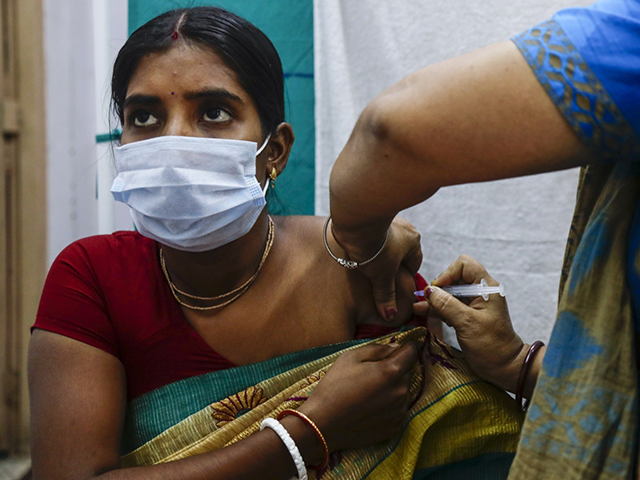Indian government officials joined pharmaceutical giant Bharat Biotech on Thursday to deny reports that Bharat’s indigenously-developed Chinese coronavirus vaccine, Covaxin, is being rushed to market under intense political pressure.
“Recent media reports around the approvals for Covaxin are incorrect and erroneous. These few individuals and organizations were mostly involved in fake news and false information during the pandemic. They fail to understand product development and licensure pathways worldwide,” Bharat Biotech said.
“We condemn the targeted narrative against Covaxin put forth by a select few individuals and groups who have no expertise in vaccines or vaccinology,” the statement continued. “It is well known that they helped perpetuate misinformation and fake news throughout the pandemic. They are unable to comprehend global product development and licensure processes.”
“There have been media reports claiming that Bharat Biotech, manufacturer of the indigenous [Chinese coronavirus] vaccine Covaxin, ‘had to skip certain processes’ and ‘speed’ up clinical trials due to political pressure,” India’s Ministry of Health and Family Welfare said on Thursday. |The reports further claim that there were several irregularities in the three phases of the clinical trials conducted for the vaccine. These media reports are completely misleading, fallacious and ill-informed.”
The Indian government and #BharatBiotech on Thursday trashed reports of the development of indigenous #Covid19 vaccine #Covaxin being rushed under political pressure as “incorrect, misleading and fallacious”. https://t.co/R7yvTSuMhb
— The Times Of India (@timesofindia) November 17, 2022
The Health Ministry said India’s Central Drugs Standard Control Organization (CDSCO) took a “scientific approach” and followed “prescribed norms” to grant emergency use authorization for Covaxin.
The report that drew such an incensed response from the Indian Health Ministry and Bharat Biotech was published on Tuesday by STAT, a medical and pharmaceutical news website.
STAT reviewed documents from the Covaxin trials and concluded Indian regulators approved the vaccine candidate despite “discrepancies in the number of clinical trial participants” and “questionable changes” made to the trial protocols.
New deep dive from @pharmalot into documents that raise questions about the approval process of Bharat Biotech’s Covid-19 vaccine https://t.co/3TEPokxIk4
— Megan Thielking (@meggophone) November 15, 2022
STAT detailed some of these changes and discrepancies, which reportedly led some public health experts to conclude Covaxin “may have been hastily approved”:
For instance, the number of people enrolled in the Phase 1 portion of the trial differed from what was later published in a medical journal. There were also important changes made to the protocol for Phase 2 testing, when immunogenicity data from the previous Phase 1 stage were not yet available.
In addition, the protocol for Phase 3 was approved while Phase 2 was still underway and the final vaccine candidate was selected without Phase 2 data, according to protocol documents and minutes of meetings held by an expert committee that reported to India’s Central Drugs Standard Control Organization (CDSCO), the national regulator responsible for approving medicines. This was the agency that authorized the vaccine for emergency use in January 2021, two months before Phase 3 results were known.
“My issue is that the confidence of the public and medical community in the regulator takes a beating when the regulator and the [expert committee] seem to accept ‘inadequate information’ to base their decisions on — or lack the clarity in their minutes to explain why this was rational,” said Christian Medical College community health professor Jacob John, one of the experts who reviewed the documents for STAT.
“They appear to be under duress, and this is a very worrying scenario,” John said.
Before trashing the STAT report entirely in Thursday’s statement, a Bharat Biotech representative told STAT the “unusual approach” taken with Covaxin was “dictated by the nature of the pandemic.”
“In a classic sense of product development, we would do everything the right way — play by the book and all the rules of the game would be followed. But here was a situation the world didn’t foresee,” argued Bharat Biotech director Krishna Mohan.
STAT noted the World Health Organization (W.H.O.) was keenly interested in getting Covaxin approved because it was much easier to transport and store than the mRNA vaccines developed by Moderna and Pfizer, making the Indian product potentially better suited for low-income countries.
STAT suggested the Indian government wanted a success story to repair the tarnished image of India’s pharmaceutical industry, which had been criticized by foreign officials, including the U.S. Food and Drug Administration.
W.H.O. suspended United Nations procurement of Covaxin in April 2022, less than six months after approving it for emergency use, due to unspecified problems with an inspection of the production facilities.
The STAT report decried the “lack of transparency” around Covaxin development, and challenged Bharat Biotech’s explanations for why testing protocols were altered, noting those explanations often cited the need for haste, or the difficulty of working on such a complex project under pandemic restrictions. STAT’s analysts felt the decision to proceed with Stage 3 trials before Stage 2 was complete was a questionable judgment call.
“This is about cutting corners and a push to have an Indian vaccine,” charged civil society activist Malini Aisola, presumably one of the people Bharat Biotech and the Indian Health Ministry had in mind when complaining about critics who lacked the scientific credentials to challenge their decisions.
“We now have a deeply compromised regulatory system going forward. They did things not in the rule book and this has become the norm. And that’s the most damaging aspect about all of this,” Aisola said.

COMMENTS
Please let us know if you're having issues with commenting.